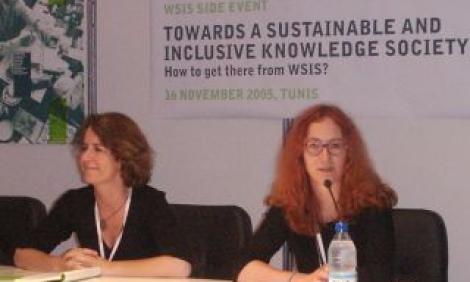In depth
Mobile telephony's promise of bridging the digital divide
The London Offices of the United Nations World Food Programme (WFP) recently received an unprecedented appeal for increased food aid. What was different about this appeal was the manner in which it was sent. According to a United Nations Commissioner for Human Rights report, a Somali refugee in Northern Kenya's Dagahaley refugee camp sent a text message by mobile phone to the WFP offices…
In depth
Reclaiming women’s space at the peace table : the Peacebuilding Cyberdialogue as a model of using ICTs for peacebuilding
Women are particularly impacted by war and violent conflicts - both as survivors as well as, crucially, being at the forefront of conflict prevention, conflict resolution and peace building. Mavic Cabrera-Balleza shares the Peacebuilding Cyberdialogue, a collaborative effort between the International Women's Tribune Centre and Isis WICCE, that brings together 40 women's organisations all over…
In depth
“The Burden of The Struggle” - Engendering Change in ICT Policy
Cheekay Cinco, member of APC WNSP, interviews Nancy Hafkin, woman pioneer of networking and ICTs development in Africa on her thoughts about the current gender and ICT policy environment. She reflects on the WSIS process and the recent Commission on the Status of Women, and articulates what is urgently needed to render visible the gender dimensions of ICTs at policy levels.
In depth
Women, Media & ICTS: Where Do We Go From Here?
This article examines the progress made on the issue of Women, Media and ICTs at the level of international advocacy, particularly in relation to the Commission on the Status of Women and the Beijing Platform for Action. Questioning the disconnection between the fields of ICTs and women's rights, it looks at strategies of gender mainstreaming, and the need to have women in decision-making…
In depth
We assume FOSS benefits all equally. But does it really?
FOSS has the potential to change the way women relate with ICTs, allowing for more control over the tools they use. As Users, women will have the freedom from steep licensing fees and the opportunity to influence software development to meet their needs. As developers, the open principle behind FOSS encourages a more collaborative environment, in which women may discover more freedom to create…
In depth
Funding ICTs: where will the money come from?
The Digital Solidarity Fund (DSF) was proposed by Senegal's President Abdoulaye Wade at Phase I of the World Summit on Information Society (WSIS) Summit. It was inaugurated by the Nigerian President Olusegun Odasanjo in March 2005, in Geneva. This fund is seen a voluntary and complementary financing mechanism to supplement existing financial mechanism. It is registered in Switzerland.

In depth
Gender equality may constitute a normative consensus, but the political will is lacking
Heike Jensen, researcher and lecturer at the Department of Gender Studies of Humboldt University in Berlin, (Germany), is one of those hardworking gender advocates, whose “effort and time spent gathering information, sleepless nights, many cups of coffee, talking, training, skills sharing, lobbying and writing” focussed on integrating gender as a relevant dimension of WSIS process and outcomes.…

In depth
From Geek to the WSIS Gender Caucus
Jac sm Kee grabs a conversation with Jacqueline A. Morris during WSIS PrepComm3 at Geneva, and finds out about how a girl from Trinidad & Tobago ends up being a gender & ICT advocate, her insights about the two priority issues in WSIS Phase II – financing and internet governance – as well as the efficacy of the WSIS Gender Caucus.
In depth
Publication Digitall Future gives a feminist perspective to the Information Society
A team of feminist journalists from Asia, Latin America, North Africa, the Middle East and Eastern and Western Europe will take part in the World Summit on Information Society (WSIS) from November 16-18th in Tunis, Tunisia.
In depth
Mobile Help-line for Women Tops Gender and ICT
Pallitathya, an innovative Mobile Help-Line programme via cell phones for underprivileged women in rural Bangladesh beat thirty other entries from all over the Asia-Pacific to win this year's Gender and Information…




